Respiratory muscle training for cystic fibrosis
- PMID: 33331663
- PMCID: PMC8406523
- DOI: 10.1002/14651858.CD006112.pub5
Respiratory muscle training for cystic fibrosis
Abstract
Background: Cystic fibrosis is the most common autosomal recessive disease in white populations, and causes respiratory dysfunction in the majority of individuals. Numerous types of respiratory muscle training to improve respiratory function and health-related quality of life in people with cystic fibrosis have been reported in the literature. Hence a systematic review of the literature is needed to establish the effectiveness of respiratory muscle training (either inspiratory or expiratory muscle training) on clinical outcomes in cystic fibrosis. This is an update of a previously published review.
Objectives: To determine the effectiveness of respiratory muscle training on clinical outcomes in people with cystic fibrosis.
Search methods: We searched the Cochrane Cystic Fibrosis and Genetic Disorders Group Trials register comprising of references identified from comprehensive electronic database searches and handsearches of relevant journals and abstract books of conference proceedings. Date of most recent search: 11 June 2020. A hand search of the Journal of Cystic Fibrosis and Pediatric Pulmonology was performed, along with an electronic search of online trial databases. Date of most recent search: 05 October 2020.
Selection criteria: Randomised controlled studies comparing respiratory muscle training with a control group in people with cystic fibrosis.
Data collection and analysis: Review authors independently selected articles for inclusion, evaluated the methodological quality of the studies, and extracted data. Additional information was sought from trial authors where necessary. The quality of the evidence was assessed using the GRADE system.
Main results: Authors identified 20 studies, of which 10 studies with 238 participants met the review's inclusion criteria. There was wide variation in the methodological and written quality of the included studies. Four of the 10 included studies were published as abstracts only and lacked concise details, thus limiting the information available. Eight studies were parallel studies and two of a cross-over design. Respiratory muscle training interventions varied dramatically, with frequency, intensity and duration ranging from thrice weekly to twice daily, 20% to 80% of maximal effort, and 10 to 30 minutes, respectively. Participant numbers ranged from 11 to 39 participants in the included studies; five studies were in adults only, one in children only and four in a combination of children and adults. No differences between treatment and control were reported in the primary outcome of pulmonary function (forced expiratory volume in one second and forced vital capacity) or postural stability (very low-quality evidence). Although no change was reported in exercise capacity as assessed by the maximum rate of oxygen use and distance completed in a six minute walk test, a 10% improvement in exercise duration was found when working at 60% of maximal effort in one study (n = 20) (very low-quality evidence). In a further study (n = 18), when working at 80% of maximal effort, health-related quality of life improved in the mastery and emotion domains (very low-quality evidence). With regards to the review's secondary outcomes, one study (n = 11) found a change in intramural pressure, functional residual capacity and maximal inspiratory pressure following training (very low-quality evidence). Another study (n=36) reported improvements in maximal inspiratory pressure following training (P < 0.001) (very low-quality evidence). A further study (n = 22) reported that respiratory muscle endurance was longer in the training group (P < 0.01). No studies reported significant differences on any other secondary outcomes. Meta-analyses could not be performed due to a lack of consistency and insufficient detail in reported outcome measures.
Authors' conclusions: There is insufficient evidence to suggest whether this intervention is beneficial or not. Healthcare practitioners should consider the use of respiratory muscle training on a case-by-case basis. Further research of reputable methodological quality is needed to determine the effectiveness of respiratory muscle training in people with cystic fibrosis. Researchers should consider the following clinical outcomes in future studies; respiratory muscle function, pulmonary function, exercise capacity, hospital admissions, and health-related quality of life. Sensory-perceptual changes, such as respiratory effort sensation (e.g. rating of perceived breathlessness) and peripheral effort sensation (e.g. rating of perceived exertion) may also help to elucidate mechanisms underpinning the effectiveness of respiratory muscle training.
Trial registration: ClinicalTrials.gov NCT03873688 NCT03190031 NCT03737630.
Copyright © 2020 The Cochrane Collaboration. Published by John Wiley & Sons, Ltd.
Conflict of interest statement
Gemma Stanford declares no potential conflicts of interest; she has received a HEE/NIHR Clinical Doctoral Fellowship grant (ref: CDRF‐2014‐05‐055) from the UK National Institute of Health Research.
Arturo Solis Moya declares no potential conflicts of interest.
Harrigan Ryan declares no potential conflicts of interest.
Figures
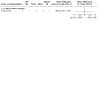
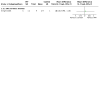
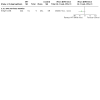
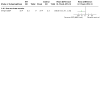
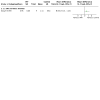

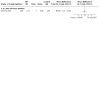
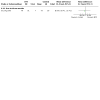
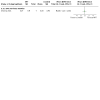
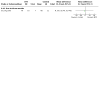
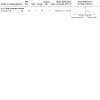
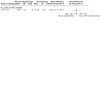



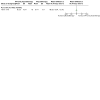

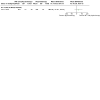

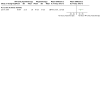
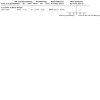
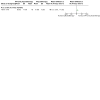
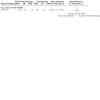


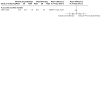


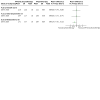





Update of
-
Respiratory muscle training for cystic fibrosis.Cochrane Database Syst Rev. 2018 May 24;5(5):CD006112. doi: 10.1002/14651858.CD006112.pub4. Cochrane Database Syst Rev. 2018. Update in: Cochrane Database Syst Rev. 2020 Dec 17;12:CD006112. doi: 10.1002/14651858.CD006112.pub5. PMID: 29797578 Free PMC article. Updated.
References
References to studies included in this review
Albinni 2004 {published data only}
-
- Albinni S, Rath R, Renner S, Eichler I. Additional inspiratory muscle training intensifies the beneficial effects of cycle ergonometer training in patients with cystic fibrosis. Journal of Cystic Fibrosis 2004;3 Suppl1:S63. [CFGD REGISTER: PE148a]
-
- Eichler I, Renner S, Albinni S, Nachbaur E, Rath R. Inspiratory muscle training adds beneficial effects to cycle ergometer training in patients with cystic fibrosis. Pediatric Pulmonology 2005;40 Suppl 28:320. [CFGD REGISTER: PE148b]
Amelina 2006 {published data only}
-
- Amelina E, Cherniak A, Chikina S, Krasovsky S, Appaeva A. Inspiratory muscle training (IMT) in cystic fibrosis adults. In: European Respiratory Society Annual Congress, Sep 2-6; Munich, Germany. 2006:716s. [ABSTRACT NO: P4112] [CFGD REGISTER: PE177a]
-
- Cherniak A, Amelina E, Krasovsky S, Nekludova G, Chikina S. The effect of high intensity inspiratory muscle training in adults with cystic fibrosis (CF). European Respiratory Journal 2007;30(Suppl 51):767s. [ABSTRACT NO: E4514] [CENTRAL: 645383] [CFGD REGISTER: PE177b]
Asher 1983 {published data only}
-
- Asher MI, Pardy RL, Coates AL, Thomas E, Macklem PT. The effects of inspiratory muscle training in patients with cystic fibrosis. American Review of Respiratory Disease 1982;126(5):855-9. [CFGD REGISTER: PE127b] - PubMed
-
- Asher MI, Pardy RL, Coates AL, Thomas E, Macklem PT. The effects of inspiratory muscle training in patients with cystic fibrosis. Australian and New Zealand Journal of Medicine (Annual Clinical and Scientific meeting for New Zealand Fellows and Advanced Trainees) 1983;13:204. [CFGD REGISTER: PE127a]
Bieli 2017 {published data only}
-
- Bieli C, Selina S, Demet I, Andreas J, Alexander M. Respiratory muscle endurance training in cystic fibrosis. European Respiratory Journal 2014;44(Suppl 58):P1972. [CENTRAL: CN-01081092] [CFGD REGISTER: PE236b] [EMBASE: 71851116]
-
- Bieli C, Summermatter S, Boutellier U, Moeller A. Respiratory muscle training improves respiratory muscle endurance but not exercise tolerance in children with cystic fibrosis. Pediatric Pulmonology 2017;52(3):331-6. [CENTRAL: 1262285] [CFGD REGISTER: PE236a] [DOI: 10.1002/ppul.23647] [PMID: ] - DOI - PubMed
Chatham 1997 {published data only}
-
- Chatham K, Ionescu A, Davies C, Baldwin J, Enright S, Shale DJ. Through range computer generated inspiratory muscle training in cystic fibrosis. Pediatric Pulmonology 1997;24 Suppl 14:299. [ABSTRACT NO: 340] [CFGD REGISTER: PE90]
de Jong 2001 {published data only}
-
- Jong W, Aalderen WM, Kraan J, Koeter GH, Schans CP. Inspiratory muscle training in patients with cystic fibrosis. Respiratory medicine 2001;95(1):31-36. [CFGD REGISTER: PE130] - PubMed
Enright 2004 {published data only}
-
- Enright S, Chatham K, Ionescu AA, Shale DJ, Unnithan V. A randomised double blind controlled trial of inspiratory muscle training in cystic fibrosis [abstract]. American Journal of Respiratory and Critical Care Medicine 2000;161(3 Suppl):A753. [CFGD REGISTER: PE138a]
-
- Enright S, Chatham K, Ionescu AA, Unnithan VB, Shale DJ. Inspiratory muscle training improves lung function and exercise capacity in adults with cystic fibrosis. Chest 2004;126(2):405-11. [CFGD REGISTER: PE138b] - PubMed
Heward 2000 {published data only}
-
- Campbell A, Enright S, Unnitham V. The effect of inspiratory muscle training on the measurement of resting energy expenditure in adult patients with cystic fibrosis and in health subjects. European Respiratory Journal 2000;16(Suppl 31):153S. [CFGD REGISTER: PE146b]
-
- Heward C, Enright S, Chatham K, Ionescu AA, Shale DJ, Unnitham V. The effect of inspiratory muscle training on lung volumes and diaphragm structure in cystic fibrosis patients and in healthy subjects. European Respiratory Journal 2000;16(Suppl 31):153S. [CFGD REGISTER: PE146a]
-
- Withnall L, Enright S, Chatham K, Ionescu AA, Shale DJ, Unnitham V. The effect of inspiratory muscle training on exercise capacity and inspiratory muscle function in cystic fibrosis patients and in healthy subjects. European Repiratory Journal 2000;16(Suppl31):330S. [CFGD REGISTER: PE146c]
Sawyer 1993 {published data only}
-
- Sawyer EH, Clanton TL. Improved pulmonary function and exercise tolerance with inspiratory muscle conditioning in children with cystic fibrosis. Chest 1993;104(5):1490-7. [CFGD REGISTER: PE170] - PubMed
Zeren 2019 {published data only}
-
- NCT03375684. Effects of inspiratory muscle training on postural stability, balance, pulmonary function and functional capacity in children with cystic fibrosis. clinicaltrials.gov/ct2/show/NCT03375684 (first posted 18 December 2017).
-
- Zeren M, Cakir E, Gurses HN. Effects of inspiratory muscle training on postural stability, pulmonary function and functional capacity in children with cystic fibrosis: a randomised controlled trial. Respiratory Medicine 2019;148:24-30. [CFGD REGISTER: PE275] [DOI: 10.1016/j.rmed.2019.01.013] - DOI - PubMed
References to studies excluded from this review
Howard 2000 {published and unpublished data}
-
- Howard J, Bradley J, Hewitt O, Elborn S. The active cycle of breathing (ACBT) is a more effective method of airway clearance in cystic fibrosis (CF) patients than the test of incremental respiratory endurance (TIRE). Pediatric Pulomonology 2000;30 Suppl 20:304. [ABSTRACT NO.: 457] [CFGD REGISTER: PE116]
Irons 2012 {published data only}
-
- Irons JY, Kenny D, Chang AB. Let's sing out!: The effect of singing on quality of life and lung function of children and adolescents with cystic fibrosis. Www.anzctr.org.au/Trial/Registration/TrialReview.aspx?ID=83944 2009. [CFGD REGISTER: PE185a ] 5500100000010548
-
- Irons JY, Kenny DT, McElrea M, Chang AB. Singing therapy for young people with cystic fibrosis: a randomized controlled pilot study. Music and Medicine 2012;4(3):136-45. [CFGD REGISTER: PE185b ] 5500100000007892
Keens 1977 {published data only}
-
- Keens TG, Krastins IRB, Wannamaker E, Levison H, Crozier DN, Bryan AC. Ventilatory muscle endurance training in normal subjects and patients with cystic fibrosis. American Review of Respiratory Disease 1977;116(5):853-60. - PubMed
Patterson 2004 {published data only}
-
- Patterson JE, Bradley JM. Inspiratory muscle training in adult patients with cystic fibrosis: a randomised controlled trial to evaluate the efficacy of the test of incremental respiratory endurance (TIRE). Thorax 2004;59(Suppl II):ii13. [ABSTRACT NO: S36] [CENTRAL: 518434] [CFGD REGISTER: PE236]
Santana‐Sosa 2014 {published data only}
-
- Santana-Sosa E, Gonzalez-Saiz L, Groeneveld IF, Villa-Asensi JR, Barrio Gomez de Aguero MI, Fleck SJ, et al. Benefits of combining inspiratory muscle with 'whole muscle' training in children with cystic fibrosis: a randomised controlled trial. British Journal of Sports Medicine 2014;48(20):1513-7. [CENTRAL: CN-00874806] [CFGD REGISTER: PE201] [PMID: ] - PubMed
Sartori 2008 {published data only}
-
- Sartori R, Barbi E, Poli F, Ronfani L, Marchetti F, Amadde O, et al. Respiratory training with a specific device in cystic fibrosis: a prospective study. Journal of Cystic Fibrosis 2008;7(4):313-9. - PubMed
Vivodtzev 2013 {published data only}
-
- Vivodtzev I, Decorte N, Wuyam B, Gonnet N, Durieu I, Levy P, et al. Benefits of neuromuscular electrical stimulation prior to endurance training in patients with cystic fibrosis and severe pulmonary dysfunction. Chest 2013;143(2):485-93. - PubMed
References to studies awaiting assessment
Emirza 2020 {published and unpublished data}
-
- Emirza C, Aslan GK, Kilinc AA, Cokugras HC. Effect of expiratory muscle training on peak cough flow in children and adolescents with cystic fibrosis. erscongress.org/images/congress-2020/programme/detailedprogramme/ExportF... (accessed 15 October 2020):198. [ABSTRACT NO.: 2968]
-
- NCT03873688. Effects of expiratory muscle training on cough efficacy in children and adolescents with cystic fibrosis. clinicaltrials.gov/ct2/show/NCT03873688 (first posted 13 March 2019).
Giacomodonato 2015 {published data only}
-
- Giacomodonato B, Graziano L, Curzi M, Perelli T, De Sanctis S, Varchetta M, et al. Respiratory muscle endurance training with normocapnic hyperpnea in patients with cystic fibrosis. A randomized controlled study. Journal of Cystic Fibrosis 2015;14 Suppl 1:S41. [ABSTRACT NO.: WS21.10] [CFGD REGISTER: PE217]
NCT03190031 {unpublished data only}
-
- NCT03190031. Respiratory muscle training in CF patients (MUCOMUREE) [Respiratory muscle training in patients with cystic fibrosis]. clinicaltrials.gov/ct2/show/NCT03190031 (first posted 16 June 2017).
NCT03737630 {unpublished data only}
-
- NCT03737630. Inspiratory muscle training in individuals with cystic fibrosis [Effects of inspiratory muscle training in individuals who have cystic fibrosis]. clinicaltrials.gov/ct2/show/NCT03737630 (first posted 09 November 2018).
Ozaydin 2010 {published data only}
-
- Ozaydin Z, Savci S, Saglam M, Arikan H, Inal-Ince D, Vardar-Yagli N, et al. Effects of inspiratory muscle training on functional capacity and muscle strength in patients with mild cystic fibrosis. In: European Respiratory Society Annual Congress; 2010 Sep 18-22; Barcelona, Spain. 2010. [ABSTRACT NO.: 5134] [CFGD REGISTER: PE235]
Additional references
Arikan 2015
-
- Arikan H, Yatar İ, Calik-Kutukcu E, Aribas Z, Saglam M, Vardar-Yagli N, et al. A comparison of respiratory and peripheral muscle strength, functional exercise capacity, activities of daily living and physical fitness in patients with cystic fibrosis and healthy subjects. Research in Developmental Disabilities 2015;45-6:147-56. [DOI: 10.1016/j.ridd.2015.07.020] - DOI - PubMed
Aris 1998
-
- Aris RM, Renner JB, Winders AD, Buell HE, Riggs DB, Lester GE, et al. Increased rate of fractures and severe kyphosis: sequelae of living into adulthood with cystic fibrosis. Annals of Internal Medicine 1998;128(3):186-93. - PubMed
Bell 2020
Caine 2000
-
- Caine MP, McConnell AK. Development and evaluation of a pressure threshold inspiratory muscle trainer for use in the context of sports performance. Sports Engineering 2000;3(3):149-59.
Cantin 2015
-
- Cantin AM, Hartl D, Konstan MW, Chmiel JF. Inflammation in cystic fibrosis lung disease: pathogensis and therapy. Journal of Cystic Fibrosis 2015;14(4):419-30. - PubMed
CFF 2019
-
- Cystic Fibrosis Foundation. Cystic Fibrosis Foundation Patient Registry 2019 Annual Data Report. www.cff.org/Research/Researcher-Resources/Patient-Registry/2019-Patient-... (accessed 16 December 2020).
Chatham 2004
-
- Chatham K, Ionescu AA, Nixon LS, Shale DJ. A short-term comparison of two methods of sputum expectoration in cystic fibrosis. European Respiratory Journal 2004;23(3):435-9. - PubMed
Chauvin 2008
Deeks 2020
-
- Deeks JJ, Higgins JP, Altman DG (editors). Chapter 10: Analysing data and undertaking meta-analyses. In: Higgins JP, Thomas J, Chandler J, Cumpston M, Li T, Page MJ, Welch VA (editors). Cochrane Handbook for Systematic Reviews of Interventions version 6.1 (updated October 2020). Cochrane, 2020. Available from www.training.cochrane.org/handbook..
Denton 1981
-
- Denton JR, Tietjen R, Gaerlan PF. Thoracic kyphosis in cystic fibrosis. Clinical Orthopaedics and Related Research 1981;155:71-4. - PubMed
Dunnink 2009
-
- Dunnink MA, Doeleman WR, Trappenburg JCA, Vries WR. Respiratory muscle strength in stable adolescent and adult patients with cystic fibrosis. Journal of Cystic Fibrosis 2009;8(1):31-6. - PubMed
Elborn 2016
-
- Elborn JS. Cystic Fibrosis. The Lancet 2016;388(10059):2519-31. - PubMed
Elbourne 2002
-
- Elbourne DR, Altman DG, Higgins JPT, Curtin F, Worthington HV, Vail A. Meta-analyses involving cross-over trials: methodological issues. International Journal of Epidemiology 2002;31(1):140-9. - PubMed
El‐Manshawi 1986
-
- El-Manshawi A, Killian KJ, Summers E, Jones N. Breathlessness during exercise with and without resistive loading. Journal of Applied Physiology 1986;61(3):896-905. - PubMed
Grasemann 2013
-
- Grasemann H, Ratjen F. Early lung disease in cystic fibrosis. The Lancet 2013;1(2):148-57. - PubMed
Higgins 2017
-
- Higgins JP , Altman DG , Sterne JA, editor(s). Chapter 8: Assessing risk of bias in included studies. In: Higgins JP, Churchill R, Chandler J, Cumpston MS, editor(s), Cochrane Handbook for Systematic Reviews of Interventions version 5.2.0 (updated June 2017). The Cochrane Collaboration, 2017. Available from www.training.cochrane.org/handbook.
Koppers 2006
-
- Koppers RJH, Vos PJE, Folgering HthM. Tube breathing as a new potential method to perform respiratory muscle training: Safety in healthy volunteers. Respiratory Medicine 2006;100:714-720. - PubMed
Kozlowska 2008
-
- Kozlowska WJ, Bush A, Wade A, Aurora P, Carr SB, Castle RA, et al. Lung function from infancy to the preschool years after clinical diagnosis of cystic fibrosis. American Journal of Respiratory and Critical Care Medicine 2008;178(1):42-9. - PubMed
Li 2020
-
- Li T, Higgins JP, Deeks JJ (editors). Chapter 5: Collecting data. In: Higgins JP, Thomas J, Chandler J, Cumpston M, Li T, Page MJ, Welch VA (editors). Cochrane Handbook for Systematic Reviews of Interventions version 6.1 (updated September 2020). Cochrane, 2020. Available from www.training.cochrane.org/handbook.
Padula 2007
-
- Padula CA, Yeaw E. Inspiratory muscle training: integrative review of use in conditions other than COPD. Research and Theory for Nursing Practice 2007;21(2):98-118. - PubMed
Radtke 2015
Ratjen 2015
Reid 1995
-
- Reid WD, Samrai B. Respiratory muscle training for patients with chronic obstructive pulmonary disease. Physical Therapy 1995;75(11):996-1005. - PubMed
Revelette 1987
-
- Revelette WR, Wiley RL. Plasticity of the mechanism subserving inspiratory load perception. Journal of Applied Physiology 1987;62(5):1901-6. - PubMed
RevMan Web 2020 [Computer program]
-
- Review Manager Web (RevMan Web). Version 1.22. The Cochrane Collaboration, 2020. Available at revman.cochrane.org.
Romer 2002
-
- Romer LE, McConnell AK, Jones DD. Effects of inspiratory muscle training on time-trial performance in trained cyclists. Journal of Sports Sciences 2002;29(97):547-62. - PubMed
Sales 2016
Schünemann 2020a
-
- Schünemann HJ, Vist GE, Higgins JP, Santesso N, Deeks JJ, Glasziou P, et al. Chapter 15: Interpreting results and drawing conclusions. In: Higgins JP, Thomas J, Chandler J, Cumpston M, Li T, Page MJ, Welch VA (editors). Cochrane Handbook for Systematic Reviews of Interventions version 6.1 (updated September 2020). Cochrane, 2020. Available from www.training.cochrane.org/handbook.
Schünemann 2020b
-
- Schünemann HJ, Higgins JP, Vist GE, Glasziou P, Akl EA, Skoetz N, et al. Chapter 14: Completing ‘Summary of findings’ tables and grading the certainty of the evidence. In: Higgins JPT, Thomas J, Chandler J, Cumpston M, Li T, Page MJ, Welch VA (editors). Cochrane Handbook for Systematic Reviews of Interventions version 6.1 (updated September 2020). Cochrane, 2020. Available from www.training.cochrane.org/handbook.
Shei 2018
UK CF Trust 2019
-
- Cystic Fibrosis Trust. UK Cystic Fibrosis Registry Annual Data Report 2019. www.cysticfibrosis.org.uk/the-work-we-do/uk-cf-registry/reporting-and-re... (accessed 16 December 2020).
Wenninger 2003
-
- Wenninger K, Aussage P, Wahn U, Staab D. The revised German Cystic Fibrosis Questionnaire: validation of a disease-specific health-related quality of life instrument. Quality of Life Research 2003;12:77–85. - PubMed
Wheatley 2011
-
- Wheatley CM, Wilkins BW, Snyder EM. Exercise is medicine in cystic fibrosis. Exercise and Sport Sciences Reviews 2011;39(3):155-60. - PubMed
Wilson 1990
-
- Wilson RC, Jones PW. Influence of prior ventilatory experience on the estimation of breathlessness during exercise. Clinical Science 1990;78(2):149-53. - PubMed
References to other published versions of this review
Hilton 2018
Houston 2008
Houston 2009
Publication types
MeSH terms
Associated data
LinkOut - more resources
Full Text Sources
Medical
Miscellaneous

